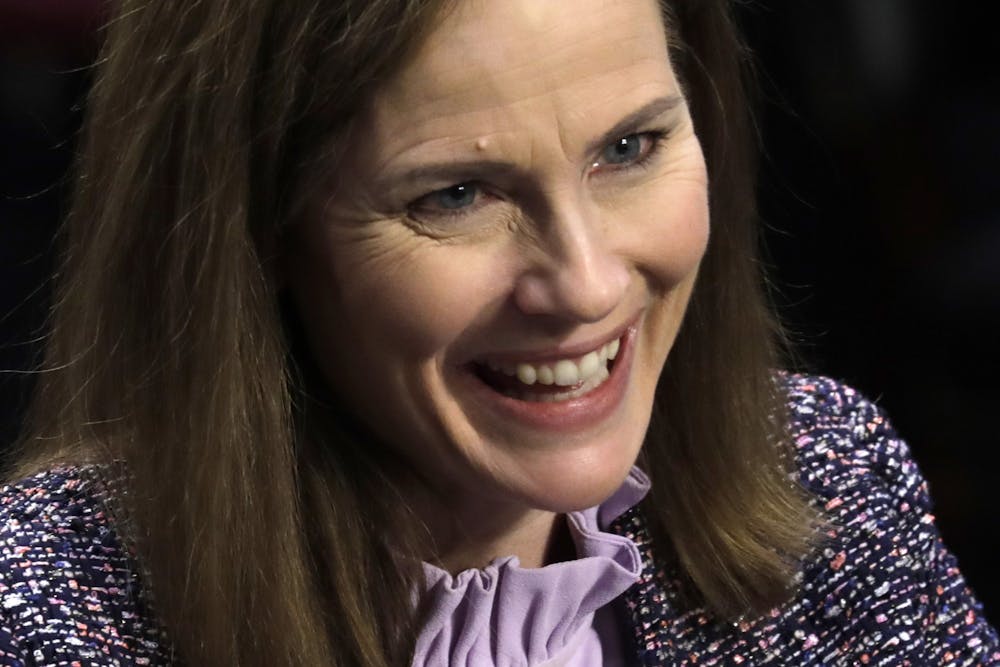Judge Amy Coney Barrett faced her last day of questioning during her controversial confirmation hearings on Thursday. These hearings took a total of four days as Republicans are rushing to place Barrett on the Supreme Court just weeks before the presidential election.
During her abrupt confirmation hearings, Barrett had a pattern of avoiding directly answering questions that involved critical issues such as abortion, climate change and LGBTQ+ rights. She attempted to portray herself as someone who can put aside her personal and religious beliefs in order to serve the people of the United States, but her history of making remarks based on her extreme religious beliefs says otherwise.
Notably, in response to Sen. Cory Booker’s, D-N.J., question about whether or not it is wrong to separate migrant children from their parents in immigration detention centers, Barrett claimed that she does not have the authority to have an opinion on this “hot political debate” topic. Ironically, Barrett is a mother to seven children, two of whom she adopted from Haiti with her husband, Jesse M. Barrett. The fact that Barrett, who was initially praised for balancing her career and raising several children all at once, refused to take a stance on the Trump administration’s horrific actions against migrants should tell Americans enough about her ability to serve on the Supreme Court.
In addition to pivoting around answering the question about migrant families, Barrett refused to comment on her views concerning climate change after Sen. Kamala Harris, D-Calif., asked her whether or not she believes humans are complicit in causing global warming. Barrett claimed her views on climate change are not relevant to her job.
In 2015, the Supreme Court legalized same sex marriage in the landmark case Obergefell v. Hodges. Sen. Diane Feinstein, D-Calif., pressed Barrett’s views on the decision and her ability to overturn the ruling if she was confirmed to the Supreme Court. Sticking to her consistent style of never directly responding to questions during the hearings, Barrett replied that she would not discriminate against someone based on their “sexual preference.” Her response did not completely answer the question, yet by using the term “sexual preference” instead of “sexual orientation,” Barrett implied she does not believe that one’s sexual orientation is a biological trait and is rather a choice.
While Barrett never explicitly commented on any major political issues during her confirmation hearings, the rate at which she refused to give concise answers to any of the questions asked to her is alarming. Barrett is strategically working her way around directly answering questions about major political issues in order to not appear too conservative or one-sided. This may cause American voters to wrongly believe that if Barrett is confirmed as a Supreme Court justice, she will rely on the facts when making judgments rather than relying on her own strong beliefs. Her past screams a different story.
From 1998 to 1999, Barrett worked as a law clerk for Justice Antonin Scalia, who was scathingly conservative. On multiple occasions, Barrett has stated that her judicial philosophy is nearly identical to that of Scalia. Furthermore, she has a close relationship with Alliance Defending Freedom, a far-right legal advocacy organization that is notoriously homophobic and against abortion rights.
In Barrett’s home state of Indiana, there have been several attempts to tighten restrictions on abortions — ones that she supported. For example, when a law that narrowed requirements for notifying the parents of minors obtaining abortions was struck down, Barrett claimed that the law should have been able to go into effect. In another instance, a law in Indiana seeking to ban abortion based on the sex or disability of a fetus and another law requiring abortion care providers to cremate or bury fetal remains were blocked. Barrett dissented, writing that both laws were justified and compared fetal remains to the remains of animals.
Her comments about the multitude of laws seeking to restrict abortion in Indiana are gut wrenching. If U.S. senators vote in favor of Barrett, the Supreme Court would have the power to completely overturn the landmark decision Roe v. Wade, which protects a pregnant person’s right to have an abortion without heavy government involvement.
Since Barrett refused to directly answer questions about any major political issues, it's unclear the decisions she would make if she is confirmed to the Supreme Court, but her record indicates she is hostile to a number of vital issues. The reproductive and marital rights of millions of Americans are at stake due to the Trump administration's unethical attempt at rushing a Supreme Court nomination. Although American voters have no direct say when it comes to Supreme Court nominees, I encourage everyone to vote in the upcoming presidential election in November. Our rights and liberties depend on it.
Rama Sardar (she/her) is a freshman studying media and filmmaking. She aspires to become a film director and a screenwriter.






